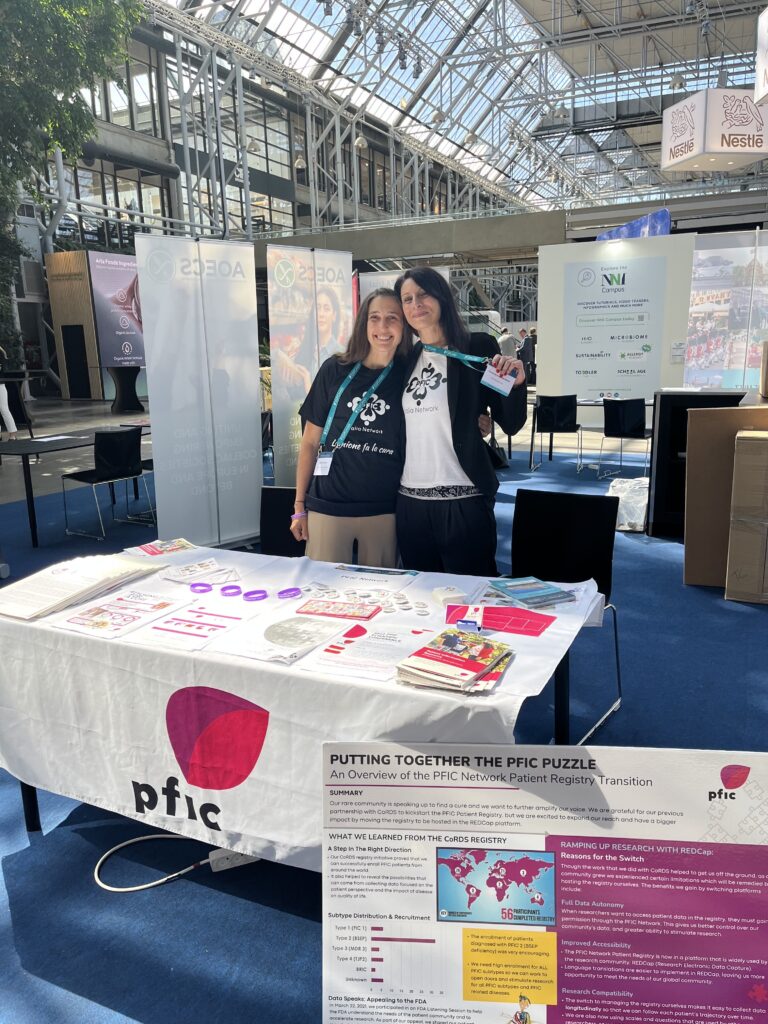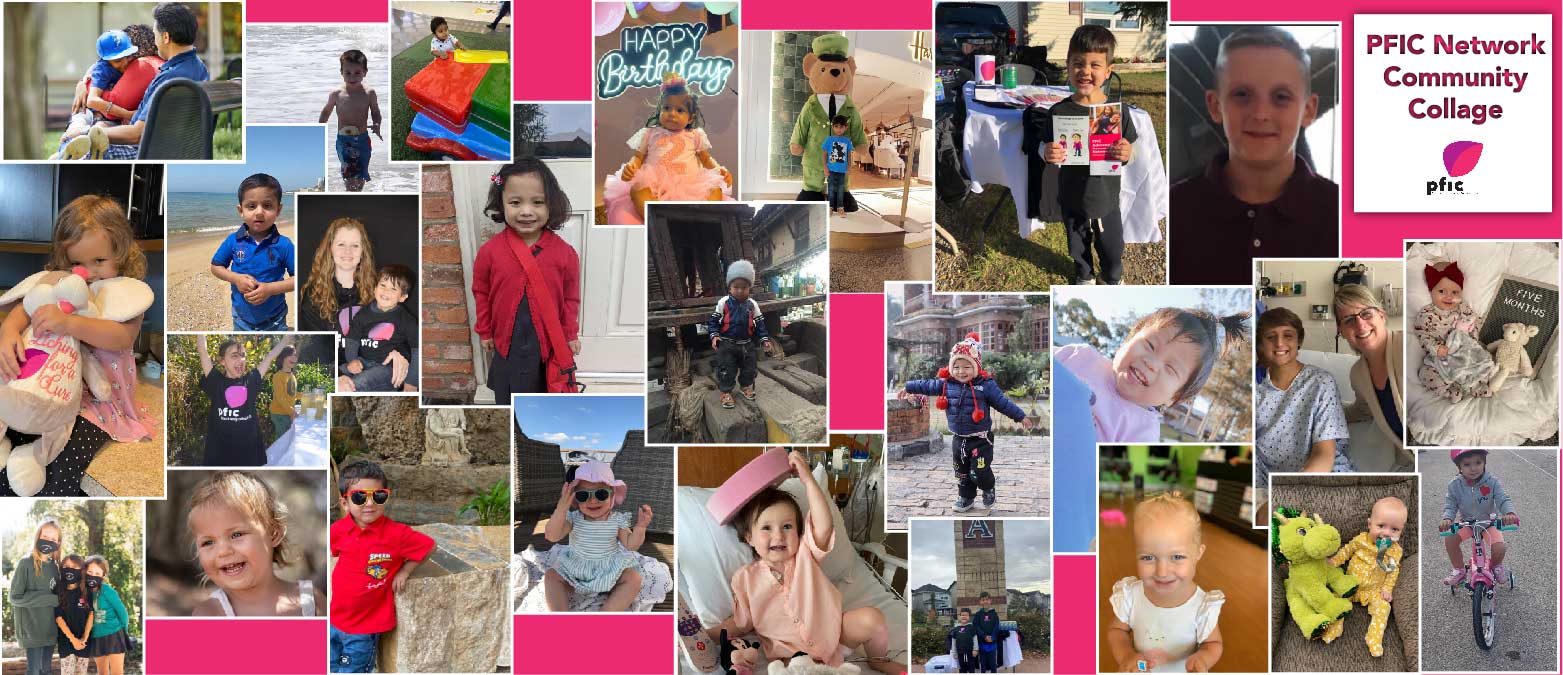Reflection: Takeaways from our Booth at the ESPGHAN Congress
by Emily Ventura, Executive Director, PFIC Network
Last week, I was invited to host a PFIC booth at the ESPGHAN Congress hosted by the European Society for Paediatric Gastroenterology, Hepatology and Nutrition. There were 6 scientific presentations that were related to PFIC specifically, and a handful more that included PFIC in the presentation. This is a very good presence for a rare disease such as PFIC at such a large scientific conference . Having a front row seat to scientific presentations in a field that is rapidly developing is an empowering experience, to say the least.
If they knew then what they knew now
Science is advancing quickly, treatments are developing and disease understanding is improving. There are more and more specialists in the field who can manage patients with PFIC and PFIC related diseases, which is wonderful in terms of accessibility to specialized care. I learned there are now 77 centers across the world that are part of a research network to treat PFIC patients. Patients need to get to these centers, and more centers need to become networked so that better care can continue to become more accessible. This is how the field will continue to move forward.
I can speak to the way that the advancement in science makes me feel firsthand. If they knew then what they know now, our lives would have been different. When my daughter Cedar was battling the first few years of life with PFIC 10 years ago, there was so much uncertainty. The interventions that were offered were all a shot in the dark. There were no medications available, uncertainty in whether the surgical options would help, and it was unclear as to whether liver transplant would be needed. Cedar has a type of PFIC 2 where she lacks the BSEP protein all together. She had genetic testing as a baby, so we knew that, but we didn’t know what it meant in terms of her treatment options and potential for disease progression.
If Cedar were diagnosed today, her disease would be further classified. They call it BSEP 3. BSEP 3 is a type of PFIC 2 mutation that causes more severe disease. It is also understood now that traditional interventions, such as the PEBD surgery that she underwent as a baby, were not going to work for her. In addition, the complication that she experiences post-transplant, AIBD, is something she experiences because of her type of genetic mutation. Knowing these things do not fix her problem, but it certainly allows for better disease management, more certainty in her treatment plan and an overall improvement in our quality of life.
Seeing this type of knowledge advancement firsthand makes me feel hope for our community. But this is only the beginning. My hope is that science continues to advance in such a way that this level of understanding is available for ALL the PFIC subtypes, so that better care and management can happen for all of us. For now, we need to be connected. Patients need highly specialized care, and they need to be seen by a specialist sooner. Increasing the time to diagnosis CAN help to improve outcomes.

Now that I know you exist
My goal in going to Europe was to meet and have conversations with the specialists, hear of the latest research, and hopefully learn of resources that I can take back to our community. What I did not prepare for was the extreme interest in the contribution that WE can make for THEIR patients. GI/Hepatologists from all over the world stopped by the PFIC booth to learn about our Network and understand the resources, education and awareness materials that we provide. This is where I got to see the Patient/Provider Outreach Program really come to life.
This program was built over two years with a goal to fill that knowledge gap upon diagnosis. Making information available on our website, through webinars and in an educational brochure was just the start. Last year, we sent packets of materials, translated in 19 different languages, to disease specialists all over the world in an effort to get this information in the hands of those who need it. At the ESPGHAN congress, I was able to take this one step further.
The PFIC booth was a hub for providers from all over who care for PFIC patients. Dozens of GI/Hepatologists stopped by the booth to learn more about our community. I gave out over 30 patient packets to providers who take care of anywhere from 1-11 PFIC patients in their clinic. I also met many wonderful, dedicated, passionate providers who understand that the disease is devastating and who long for the day that they can do more for their patients.
The common phrase after visiting our booth was, “Now that I know you exist I can connect my patients to a larger community.” This alone can help alleviate the “alone” and “hopeless” feelings that accompany a PFIC diagnosis. And hopefully we can provide each other some support as we are waiting for science to advance and to reach all areas of the world.
Must Work Together So that the Work Can be Done Faster
From an outreach, awareness and research perspective, things are moving forward. But it’s not enough. In the week that it took me to write this post, a beautiful little boy in India passed away from PFIC. Another two in Pakistan and India were diagnosed. A 30-year-old woman in Australia is suffering with BRIC/PFIC symptoms that are persistent. The uncertainty in what lies ahead is unnerving for her and for others who sit in the unknown territory of “when will my disease progress” and “what can they do for me.” The disease is overwhelming, devastating and heartbreaking.
We need each other. We need to work together to support each other, to educate each other and to work together to achieve a better quality of life for PFIC patients. We need to participate in research when it’s available so that we can continue to learn more to benefit the community at large. We need to fight together to find a cure.
A very big thank you to the organizers of ESPGHAN for inviting me to represent the PFIC Network. And to Francesca with PFIC Italia Network for joining me to show the strength in our global network. It was a wonderful experience all around and I look forward to more of these opportunities.
